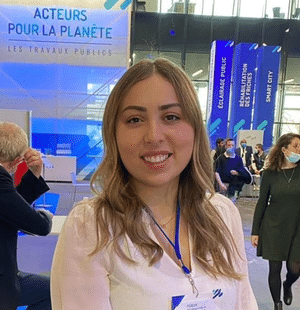
- This event has passed.
[Thesis defense] Gayelle Fahed ‘Understanding of the interactions between hydrates and pore solution to predict the evolution of transport properties during the propagation of seawater in low carbon cementitious materials.’
16 December 2024 à 10 h 15 – 11 h 30
Gayelle Fahed, PhD student in TRU DURPRO, will defend her thesis on December, 16 2024 at 10.15am at Campus Heinlex Saint-Nazaire (Salle des séminaires – Building 17) on the subject :
‘Understanding of the interactions between hydrates and pore solution to predict the evolution of transport properties during the propagation of seawater in low carbon cementitious materials.‘
Composition of the jury :
– Assia DJERBI, Maitre de conférences, HDR, Université Gustave Eiffel, Val de Marne
– Ameur El Amine HAMAMI, Maitre de conférences, HDR, La Rochelle Université
– Myriam CARCASSES, Professeure des Universités, Université Paul Sabatier
– Eduardos KOENDERS, Professeur des Universités, Technical University of Darmstadt
– Abdelghafour AIT ALAIWA, Ingénieur Bétons, Vinci Construction Grands Projets
– Stéphanie BONNET, Professeure des Universités, Nantes Université
– Anthony SOIVE, Directeur de recherche, CEREMA Méditerranée
Abstract :
The environmental impact of cement production highlights the need for low-carbon alternatives like SCMs. However, their behavior in marine environments requires more research. The estimation of the long-term durability depends on our capacity to evaluate the evolution of the ingress transport properties. Our study examines four eco-friendly mortars incorporating slag, silica fume, fly ash, and metakaolin. Chloride transport, is influenced by the concrete’s properties and exposure conditions. Mix adjustments and extending curing periods, can densify the microstructure and increase chloride-binding, reducing chloride penetration. To decouple theses phenomena, we have designed our study to seperate the effect of hydration from those of exposure through two distinct experimental campaign conducted for the same time. The first assess SCM’s impact on mechanical, durability and microstructure properties during water curing at various hydration stages. The second examines seawater diffusion’s impact on microstructure and chloride ingress considering the multi-ionic nature of seawater over 6, 12, 19, and 28 months. A key innovation is quantifying seawater exposure effects by depth, enabling accurate transport property calculations and improving durability predictions. Numerical modeling by simulating the evolution of solid species using a physically and chemically based reactive transport model developed with the thermochemical code Toughreact complements the experiments by simulating the transport and chemical interactions of ions in the material, enhancing prediction capabilities for long-term durability.



